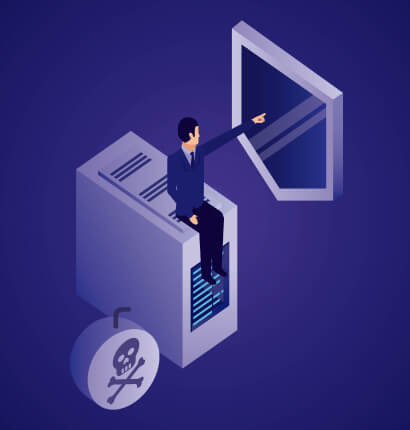
In today's interconnected world, cyber threats are a constant reality. From phishing scams to sophisticated malware, bad actors are always looking for ways to exploit vulnerabilities and compromise your data. But don't worry! By adopting a few simple yet effective cybersecurity practices, you can significantly reduce your risk and protect your digital life.
Here's your guide to staying safe online:
1. Your Password: The VIP Pass to Your Digital World
Think of your passwords as the ultimate VIP pass to your online accounts. You wouldn't use the same key for your home, car, and office, right? The same goes for your digital life.
- Make them strong: Mix uppercase and lowercase letters, numbers, and special characters. Aim for at least 12-16 characters – the longer, the better!
- Make them unique: Never reuse passwords. If one account is compromised, the others stay safe and sound.
- Consider a password manager: These tools are a lifesaver! They can generate and securely store strong, unique passwords for all your accounts, making your life easier and much more secure.
2. Embrace Multi-Factor Authentication (MFA): Your Extra Layer of Security
MFA adds an extra guardian beyond just your password. Even if a hacker somehow gets your password, they'll still need a second form of verification—like a code sent to your phone or a fingerprint—to get in. Enable MFA wherever it's available, especially for your email, banking, and social media accounts. It’s like having a double-locked door!
3. Keep Your Software Updated: Your Digital Shield
Software updates aren't just about cool new features; they often include critical security fixes for newly discovered vulnerabilities. Cybercriminals constantly look for these weaknesses to exploit.
- Enable automatic updates: For your operating systems, browsers, and frequently used apps.
- Regularly check for updates: Especially for less frequently used software or plugins. Keeping everything updated is like keeping your digital shield in top condition.
4. Be Wary of Phishing Attempts: Don't Take the Bait!
Phishing is a sneaky trick where attackers try to fool you into revealing sensitive information by pretending to be someone you trust (like your bank, a popular website, or even a colleague).
- Scrutinize emails and messages: Look for typos, generic greetings, urgent demands, and suspicious links or attachments.
- Verify the sender: If something feels off, don't click! Instead, go directly to the official website or contact the sender through a known, legitimate channel.
- Think before you click: If an offer seems too good to be true, it probably is. Trust your gut!
5. Secure Your Network: Protect Your Digital Home
Your home or office Wi-Fi network is a potential doorway for cyber attackers. Let's lock it down!
- Use a strong password for your Wi-Fi: Change the default password your router came with immediately.
- Enable WPA2 or WPA3 encryption: These are the strongest encryption standards available.
- Consider a firewall: A firewall acts as a bouncer, controlling who gets in and out of your network and blocking malicious attempts.
- Be cautious with public Wi-Fi: Avoid sensitive transactions (like online banking) on unsecured public networks. If you must use public Wi-Fi, consider a Virtual Private Network (VPN) to encrypt your connection.
6. Back Up Your Data Regularly: Your Digital Safety Net
Imagine losing all your important documents, cherished photos, or crucial business files. Regular backups are your ultimate safety net against data loss from cyber attacks (like ransomware), hardware failure, or accidental deletion.
- Automate backups: Set up a schedule for automatic backups to an external hard drive or cloud storage.
- Store backups offsite: Keep a copy of your critical data in a separate physical location or a secure cloud service.
7. Install and Maintain Antivirus/Anti-Malware Software: Your Digital Bodyguard
Antivirus software is like a vigilant bodyguard for your devices, constantly scanning, detecting, and removing malicious software like viruses, worms, Trojans, and ransomware.
- Install reputable software: Choose a well-known and trusted antivirus solution.
- Keep it updated: Ensure your antivirus definitions are current to protect against the latest threats.
- Run regular scans: Schedule periodic full system scans to keep your devices clean.
8. Educate Yourself and Others: The Power of Knowledge
Cybersecurity is an ongoing journey of learning. Stay informed about the latest threats and best practices. If you run a business, empower your employees with cybersecurity awareness training. Human error is often a significant factor in data breaches, so equipping your team with knowledge is absolutely crucial.
What This All Means for Your Business
The commitment to robust cybersecurity isn't just a technical task; it's a strategic imperative. For businesses, prioritizing cybersecurity directly translates to:
- Enhanced Trust and Reputation: Protecting customer data builds confidence and reinforces your brand's reliability in the marketplace.
- Business Continuity and Resilience: Minimizing the risk of disruptive cyber incidents ensures your operations remain uninterrupted, safeguarding productivity and revenue.
- Compliance with Regulations: Adhering to data protection laws (like GDPR or HIPAA, depending on your industry and location) avoids hefty fines and legal repercussions.
- Protection of Intellectual Property: Your critical business data, trade secrets, and innovations are shielded from competitors and malicious actors.
- A Significant Competitive Advantage: Businesses known for their strong security posture will undoubtedly stand out, attracting more clients and partnerships in their respective markets.
Embracing strong cybersecurity practices isn't about an added cost; it's about a fundamental investment in the stability, integrity, and future success of your business. It's about protecting your assets, your customers, and your reputation in an increasingly digital world.
Ready to ensure your business is fortified against the ever-evolving cyber threat landscape?
At Devnest, we're dedicated to helping businesses like yours navigate the complexities of cybersecurity and implement robust defenses. Contact us today for a consultation. Let's chat about how we can safeguard your digital assets and empower your business to thrive securely online.


Amazing Solutions For Web Design
Must explain to you how all this mistaken idea of denouncing pleasure and praising pain was born and I will give you a complete account of the system, and expound the actual teachings of the great explorer of the truth, the master-builder of human happiness. No one rejects, dislikes, or avoids pleasure itself, because it is pleasure, but because those who do not know how to pursue pleasure rationally encounter consequences that are extremely painful. Nor again is there anyone who loves or pursues or desires to obtain pain of itself, because it is pain, but because occasionally circumstances
Handling Mounting And Unmounting Of Given Navigation Routes In React Native
No one rejects, dislikes, or avoids pleasure itself, because it is pleasure, but because those who do not know how to pursue pleasure rationally encounter consequences that are extremely painful. Nor again is there anyone who loves or pursues or desires to obtain pain of itself because it is painse



